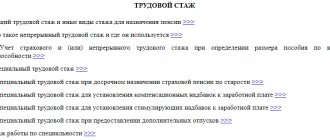Dismissal at the initiative of the employee
An application for dismissal on the initiative of an employee (at his own request) does not imply approval by the employer and is of a notification nature. However, Article 80 of the Labor Code of the Russian Federation, which regulates the procedure for terminating an employment contract at the initiative of an employee, provides for compliance with certain rules by both the employee and the employer.
Note
The article does not discuss dismissal at the initiative of the employer.
As a general rule, an employee must notify the employer in writing of his dismissal no later than 2 weeks in advance. The two-week period begins on the day after the date the employer receives the application. The specified two-week period includes non-working days.
Please be aware of statutory exceptions. For example, dismissal during the probationary period: in this case, it is enough to notify the employer just 3 days before dismissal. If the head of an organization resigns, notice of dismissal must be given one month in advance.
By agreement between the employee and the employer, the period before dismissal can be shortened or extended by indicating the corresponding date in the resignation letter.
On the day of dismissal, the employer should complete all documents and issue the final payment to the employee (Article 140 of the Labor Code of the Russian Federation). If the last day of a two-week period falls on a non-working day, then the end of the period is considered to be the next working day following it (Article 14 of the Labor Code of the Russian Federation).
The law does not oblige an employee to be at the workplace during the period before dismissal. The Labor Code does not contain such a thing as “working two weeks before dismissal.” Part 1 of Article 80 of the Labor Code of the Russian Federation states the need to warn the employer in writing at least 2 weeks before dismissal.
An employee may go on vacation (according to a schedule or in agreement with management), be on sick leave, etc. In this case, the specified period is not extended and is provided to the employer to select a replacement for the resigning employee. The employee should be dismissed on the day agreed with the employer and specified in the application at his own request.
| 1C:ITS For more information on dismissal at the initiative of an employee, see the section “Consultations on Legislation”. |
Leave for conscripts
First, we note that, by virtue of Art.
127 of the Labor Code of the Russian Federation, when on vacation followed by dismissal, the day of dismissal is considered the last day of vacation. Moreover, such leave can be used even if a fixed-term employment contract was concluded with the employee and its term ended during the leave.
note
According to Part 3 of Art. 127 of the Labor Code of the Russian Federation, upon dismissal due to the expiration of the employment contract, leave followed by dismissal can be granted even when the vacation time completely or partially extends beyond the contract term. In this case, the day of dismissal is also considered the last day of vacation.
And here we have to remember that, by virtue of Part 1 of Art. 79 of the Labor Code of the Russian Federation, a fixed-term employment contract is terminated upon expiration of its validity period. The employee must be notified of such termination of employment in writing at least three calendar days before dismissal, except in cases where the contract concluded for the duration of the duties of the absent employee expires.
Let's add: according to Art. 58 of the Labor Code of the Russian Federation, if neither party requested termination of a fixed-term employment contract due to the expiration of its validity period and the employee continues to work after that, the condition on the fixed-term nature of the contract loses force and it is considered concluded for an indefinite period.
But two questions immediately arise: is it necessary to send the employee notice of the expiration of the employment contract, and will the contract subsequently become indefinite if this is not done?
As judicial practice shows, in such cases such contracts are not recognized as unlimited. However, the employer can play it safe and notify the employee. Moreover, it is better to do this in advance - as soon as you receive an application from the employee requesting leave with subsequent dismissal.
Employee's right to leave
When planning dismissal, an employee can exercise the right to leave. An employee is entitled to paid leave for each year worked. An employee’s working year begins from the moment he is hired, and not from January 1 (Rostrud letter No. 854-6-1 dated June 14, 2012).
At the same time, the right to use vacation for the first year of work arises for the employee after 6 months of continuous work with this employer (Article 122 of the Labor Code of the Russian Federation). This means that if after 6 months of work (provided that this entire period is included in the length of service giving the right to basic leave), an employee applies for leave, then there are no grounds for refusal (letter of Rostrud dated February 27, 2013 No. 155- 6-1). After 6 months of work, the employee has the right to receive the entire annual basic paid leave (for the working year).
By agreement of the parties and based on the employee’s application, the employer may grant leave earlier, before the expiration of the six-month period. Before the expiration of 6 months of continuous work, paid leave must be provided (at the request of the employee):
- for women - before maternity leave or immediately after it;
- employees under the age of 18, etc.
The Labor Code does not provide for the provision of leave in proportion to the time worked in a given working year (in kind). In accordance with the vacation schedule, vacation for the second and subsequent working years can also be granted in full in the first month of the working year.
An employee may request more leave than is required based on the time actually worked during the working year as of the date of the application. The employer has no legal grounds for refusing to provide such leave. But the employer is not obliged to provide more days than the employee is entitled to under the Labor Code of the Russian Federation until the end of the current working year.
| 1C:ITS For more information on the calculation of length of service giving the right to annual basic paid leave, see the section “Legislative Consultations”. |
If the employer does not want to sign such a statement
In most cases, the employer has every right to refuse an employee to use vacation before dismissal. But exceptions are possible. For example, if the vacation time followed by dismissal completely coincides with the vacation period assigned to the employee according to the vacation schedule approved by the enterprise. Also, the employer will be required to agree with the employee’s decision when a clause on such leave is in the dismissal agreement concluded between these two parties.
Vacation granted, but not worked out
In practice, it is quite common for an employee to go on vacation for the next working year without having earned it yet.
For example, an employee has been working since May 12, 2018. In 2021, he fully used 28 days of allotted vacation for the working year 05/12/2018-05/11/2019. The next scheduled vacation is scheduled for June 2021. Regarding the working year 05/12/2019-05/11/2020, this will be leave provided in advance. An employer cannot refuse an employee to use all 28 days of vacation at once. The employer has the right not to agree to leave of longer duration.
If this employee expresses a desire to resign before the end of his working year, then the employer, in accordance with Article 137 of the Labor Code of the Russian Federation, has the right to withhold payment for unworked vacation days. The employee's consent to such retention is not required. However, Article 138 of the Labor Code of the Russian Federation limits such deductions to 20% of the amount payable. The employer has the right to voluntarily refuse withholding. Otherwise, amounts exceeding the established limit may either be withheld with the written consent of the employee, or recovered in court.
Withholding payment amounts for used but unworked vacation days from an employee’s salary can be interpreted in different ways:
- how to withhold from an employee the amounts of payment for used but unworked vacation days;
- as a refund by an employee of excessively accrued vacation pay.
On the one hand, Article 137 of the Labor Code of the Russian Federation states that the employer can make a deduction from the employee’s salary. There are two key words to pay attention to: “hold” and “may.” Considering this type of calculation to be withholding, it cannot be regarded as income and cannot be included in the calculation base for personal income tax and insurance premiums. Therefore, no compensation can arise. Let us add that even if the funds are withheld, the employee will receive non-refundable income in the form of vacation days, which is simply impossible to return. This is due to the fact that information about the days included in the length of service as part of the main vacation has already been transferred to the Pension Fund.
The word “may” used in the Labor Code, in contrast to the word “shall,” indicates that it is up to the employer to decide whether to apply this deduction or not. The employer has the option not to exercise this right.
On the other hand, there was an excessive accrual of vacation pay to the employee due to the fact that he quits without completing the working year. And these amounts should be reflected in the accounting records as reversals. Consequently, when reversing excessively accrued vacation pay, the employer must return the excessively withheld personal income tax to the employee and reduce the calculation base for insurance premiums. Reversal due to recalculation is not a withholding, and therefore does not entail the restrictions listed in Article 138 of the Labor Code of the Russian Federation.
| 1C:ITS For more information about reflecting deductions for unworked vacation days upon dismissal, including in 1C programs, see the section “Instructions for accounting in 1C programs.” |
To avoid disputes, the adopted calculation methodology must be enshrined in local regulatory documents and reflected in the settings of the 1C: Salaries and Personnel Management 8 program, edition 3.
Temporary disability
In the event that an employee falls ill while on vacation with subsequent dismissal, he is paid temporary disability benefits (letter of Rostrud dated December 24, 2007 No. 5277-6-1). The benefit is calculated according to the general rules, which are enshrined in the Federal Law of December 29, 2006 No. 255-FZ “On compulsory social insurance in case of temporary disability and in connection with maternity.”
In this case, the date of dismissal is not postponed, since there is no provision for extending the leave by the number of days of illness, as well as its transfer to another time.
Deductions upon dismissal in “1C: Salaries and personnel management 8” (rev. 3)
In the section Deduction upon dismissal for vacation used in advance, select the appropriate switch position: Retention and does not reduce taxes and contributions or Reversal of accruals and reduces taxes and contributions (Settings menu - Payroll - link Setting up the composition of accruals and deductions - Deductions tab), rice. 1.
Rice. 1. Setting up deduction upon dismissal for vacation used in advance
By default, in the program “1C: Salary and Personnel Management 8” (rev. 3), the deduction upon dismissal for vacation used in advance is reversed and reduces personal income tax and insurance premiums.
Dismissal after vacation
An employee can resign of his own free will immediately after the vacation.
In this case, two options are possible:
- An employee writes a letter of resignation after taking a vacation (see Example 1).
- The employee simultaneously submits two applications: for leave and for dismissal immediately after the leave (see Example 2).
The first option is reflected in the usual manner. Vacation has been issued. Vacation days are provided in advance in full in accordance with the law.
Vacation pay based on average earnings is accrued and paid in accordance with the law.
Based on the resignation letter received after the vacation, during the final payment, together with accruals for the days of “work,” the employer, taking into account the salary regulations, makes all the necessary deductions or reversals.
Before the notice period for dismissal expires, the employee has the right to change his mind about resigning and may withdraw his application.
Part 4 of Article 80 of the Labor Code of the Russian Federation provides that an employee cannot withdraw his resignation letter only if another employee has already been invited in writing to take his place and who, in accordance with federal law, cannot be denied an employment contract.
If an employee falls ill during the vacation period, then, as a general rule, he has the right, in agreement with management, to extend, postpone the vacation, or receive compensation upon dismissal upon final payment.
In the 1C: Salary and Personnel Management 8 program, edition 3, the accounting of sick days during the vacation period, including before dismissal, is automated.
In the second option, providing leave followed by dismissal is a right, not an obligation, of the employer.
If such leave is granted, the day of dismissal is considered the last day of leave. For mutual settlements with the employee, the last day of work in this case becomes the day before the start of the vacation. On this day, the employee should be given a work book and all necessary settlements should be made. The employee does not have the right to withdraw his resignation from the moment the vacation begins. This is a kind of exception to the general rule, confirmed by judicial practice and clarifications of authorized bodies.
So, for example, the letter of Rostrud dated December 24, 2007 No. 5277-6-1 explains that in accordance with Article 127 of the Labor Code of the Russian Federation, upon a written application from an employee, unused vacations can be granted to him with subsequent dismissal (except for cases of dismissal for guilty actions). Leave followed by dismissal is granted for the full (i.e. established) duration, regardless of the time worked in the working year. However, only those vacation days that would be subject to monetary compensation upon dismissal are actually paid.
This is explained by the fact that the vacation to be replaced by monetary compensation upon dismissal of an employee is calculated based on the fact that full vacation is due to an employee who has worked a full working year.
For example, an employee has been working since May 12, 2018. Until 05/11/2019, he fully used 28 days of allotted vacation for the working year 05/12/2018-05/11/2019.
The employee goes on another 28-day vacation for the working year 05/12/2019-05/11/2020 according to the schedule from 05/15/2019 to 06/11/2019. The employee resigns on the day the vacation ends, June 11. In the next working year, only 1 month was worked, therefore, 2.33 days are subject to payment. This is how compensation for unused vacation would have been calculated if the employee had not gone on vacation.
The ruling of the Constitutional Court of the Russian Federation dated January 25, 2007 No. 131-О-О confirms that, in fact, the employment relationship with the employee terminates from the moment the vacation begins. That is why, in accordance with Part 4 of Article 127 of the Labor Code of the Russian Federation, an employee who has been granted unused leave with subsequent dismissal on his own initiative does not have the right to withdraw his resignation letter after the start of the leave, even if this is only the first day of leave.
During illness during the vacation period followed by dismissal, the employee is paid temporary disability benefits. But the employer is not obligated to the employee to extend leave for sick days in accordance with Part 1 of Article 124 of the Labor Code of the Russian Federation, because the employee himself expressed the desire to terminate the employment relationship with the employer at the end of the leave. Moreover, all days of incapacity for work are subject to payment, regardless of when the sick leave period ends (Article 5 of Federal Law No. 255-FZ of December 29, 2006, hereinafter referred to as Law No. 255-FZ).
This position is confirmed by judicial practice - see Determination of the Supreme Court of the Russian Federation dated November 23, 2015 No. 34-КГ15-13. An employee’s illness during leave followed by dismissal does not reduce the number of days of annual leave that remained unused during work and were paid when granting leave followed by dismissal. Therefore, the employer has no reason to recalculate and reduce the amount of vacation pay paid.
The Federal Social Insurance Fund of the Russian Federation, in a letter dated January 28, 2014 No. 15-02-01/04-9363p, confirms that the payment of temporary disability benefits for calendar days of illness in the event of an employee’s illness occurring during the period of vacation followed by dismissal does not contradict the norms of Part 1 of Article 1.3 of the Law No. 255-FZ. The letter clarifies that the law does not provide for the extension of leave for employee days of illness. This means that both vacation and sick leave in this exceptional case actually fall on the same days.
As a general rule, if an employee becomes ill or injured within 30 days of dismissal, the employer is required to pay benefits calculated based on 60% of average earnings. In relation to leave followed by dismissal, 30 days are counted from the day following the day the leave ends. The case of illness on vacation followed by dismissal is rare, and in the 1C: Salaries and Personnel Management 8 version 3 program, manual adjustments may need to be made.
| “1C:ZUP 8” (ed. 3): setting up deduction upon dismissal for vacation used in advance (+ video) |
Application and order for leave with subsequent dismissal, registration procedure
The employee usually makes 2 statements:
- on vacation followed by dismissal;
- for dismissal with reasons.
And the management issues 2 orders:
- on granting leave (based on the employee’s first application);
- on termination of the employment contract (based on the second application).
It is also possible to draw up one application from an employee: you can write an application for leave with subsequent dismissal at your own request - this does not contradict the norms of the Labor Code of the Russian Federation.
But when using a unified form of documents, the employer still issues two orders, because the form of a single order is not officially established. Forms of orders that can be used are documents of form T-6 (T-6a) and T-8 (T-8a), recorded in Resolution of the State Statistics Committee dated January 5, 2004 No. 1. The original is attached to one of them as a basis, and for the second - a copy of the employee’s application. Order forms must be approved by the company's management as accounting documents.
The second option for management is not to use standardized forms, but to develop the order form yourself. Then you can execute both actions with one order. The main thing is that it contains the required details of the primary accounting document.
Application for leave followed by dismissal, sample 2020
The employee is given a work book on the last day before the vacation, despite the fact that he will be fired on the last day of his vacation.
Example: Dudnikova I.N. takes 28 days of rest from April 17, 2018 and quits. She receives her work book and paycheck on April 16—the last working day before leaving. She will be officially fired on May 16, 2018, the last day of rest. Please note that two more days are added to the main days for non-working holidays - May 1 and May 9. Holidays are extended due to holidays. This period is counted in the work experience of I.N. Dudnikova, which is reflected in the order and work book.
Order for leave followed by dismissal, sample 2020
A sample of a self-developed order form based on the example application given above. An order drawn up in this form is issued once.
Dismissal after vacation in “1C: Salary and Personnel Management 8” (rev. 3)
Let's consider the procedure for reflecting in 1C: Salaries and Personnel Management 8, edition 3, the dismissal of an employee after a vacation.
In the organization, local regulations stipulate that upon dismissal, deduction for vacation used in advance is registered as a reversal of accruals and reduces personal income tax and insurance premiums.
Employee S.S. Gorbunkov has been working since February 22, 2018. Starting from the next working year - 02/22/2019 S.S. Gorbunkov did not use his right to basic annual leave. Starting from the first day of the next working year (02/22/2019), the employee can use a full 28 days of vacation. The employee announced his intention to go on vacation in accordance with the schedule for 28 days from 08/01/2019. As of 08/01/2019, the accumulated vacation balance is reflected in the Certificate of Vacation Balances report and amounts to 8.67 days (Fig. 2). This means that 19.33 days of vacation are provided to the employee in advance.
Rice. 2. Certificate of vacation balances
The employee was accrued and paid for 28 days of vacation for the period 08/01/2019-08/28/2019 in the amount of RUB 28,668.92.
Example 1
| S.S. Gorbunkov, after his vacation on August 29, 2019, gave 2 weeks’ notice in a statement of his intention to resign effective September 12, 2019. In addition, the employee submitted an application agreed with management for leave without pay for the period from 08/29/2019 to 09/12/2019. Working days after leaving the vacation used in advance and the day of dismissal from S.S. Gorbunkov was not there. |
During the final calculation in the Dismissal document, on the Vacation Compensation tab, the number of days for which the vacation used in advance should be Withheld is calculated (Fig. 3).
As of the day of dismissal, September 12, 2019, this is 14.67 days. Of the previously accrued vacation pay, 15,020.47 rubles are reversed, and personal income tax in the amount of 1,953 rubles. returnable. If the employee had accrued amounts, then the vacation reversal could be offset. In accordance with the condition of Example 1, accruals upon final settlement from S.S. There is no Gorbunkov, therefore, there is no reason for the employer to receive excessively accrued vacation pay from the employee.
Rice. 3. Analysis of the vacation balance during the final payment upon dismissal
Is it possible to withdraw such a statement?
The law allows an employee of an enterprise to withdraw such a statement, but only if this is done before the start of the vacation . This is due to the fact that the entire dismissal procedure is carried out before the employee goes on vacation; accordingly, starting from the first day of vacation, the employment relationship with him is actually considered severed.
Also, the employer has every right to refuse to withdraw an application if a replacement has already been found to replace the person being dismissed and the person who received the job offer cannot be refused for certain reasons prescribed by law.








